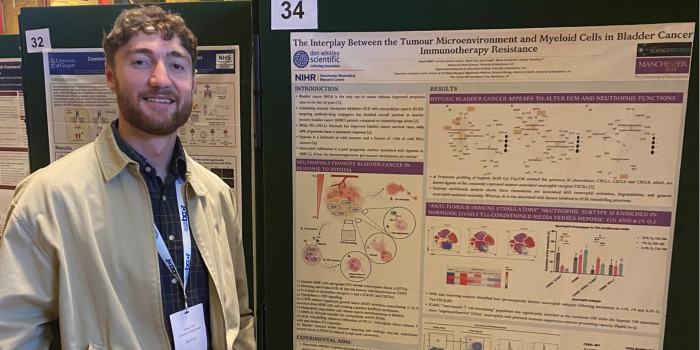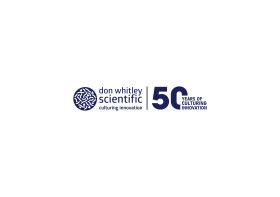
Don Whitley Scientific (DWS) recently awarded the DWS Travel Grant to Fraser Child, a PhD student at the University of Manchester. The award enabled Fraser to present his research, ‘The Interplay Between the Tumour Microenvironment and Myeloid Cells in Bladder Cancer Immunotherapy Resistance’, at the British Association for Cancer Research (BACR) 65th Anniversary Conference in Edinburgh, which was held between 2 – 4 June 2025.
We asked Fraser to share more about his work and experience at the BACR:
“I am Fraser Child, a PhD student currently in my second year at the University of Manchester. Thanks to the DWS Travel Grant, I was able to present my research investigating myeloid cell polarisation mechanisms in the hypoxic bladder cancer microenvironment at the BACR 65th Anniversary Conference.
Immune checkpoint inhibitors (ICI) are successful in treating several solid tumours. In bladder cancer, only 1 in 5 patients show a sustained response. Multiple factors within the tumour microenvironment (TME) have a role in conferring resistance to immunotherapies. Amongst the well-studied factors associated with ICI resistance are tumour hypoxia (low oxygen concentration) and neutrophils infiltration.
The Whitley H35 HEPA Hypoxystation was critical to derive muscle-invasive bladder cancer (MIBC) cell conditioned media that modelled the tumour-secreted components under pathologically relevant oxygen tensions. We obtained conditioned media from MIBC cells cultured in 21% oxygen (O2) (normal atmospheric O2 or normoxia) as well as 1% O2 and 0.2% O2 (hypoxia). We isolated neutrophils from the blood of healthy volunteers and incubated them in the normoxic and hypoxic MIBC conditioned media. After 24 hours, we analysed neutrophil phenotypes via flow cytometry. More “anti-tumour” neutrophils were detected in normoxic conditions while, more “pro-tumour” neutrophils were present in the hypoxic conditions.
It was a fantastic opportunity to present this work at the BACR 65th Anniversary Conference, alongside an eclectic programme of oncology research topics. Crucially, I was able to network with like-minded scientists and gain insight from world-leading researchers at poster and lunch sessions as well as the gala dinner. I had a great time at this conference and have come away feeling all the more inspired. I would like to thank DWS for awarding the DWS Travel Grant and making this all possible.”

If you’re like Fraser and feel inspired by the opportunities available at DWS, please click here for more information. If you would prefer to check out our hypoxic workstation range, please see the products below.


 au
au

 xEnglish
xEnglish